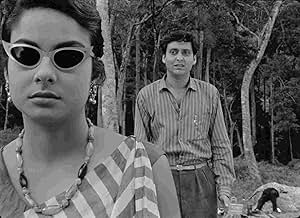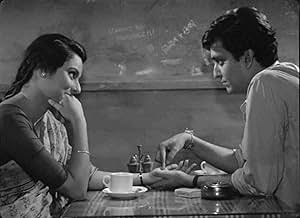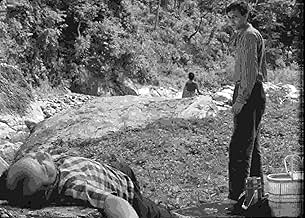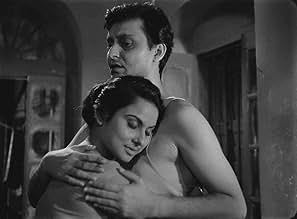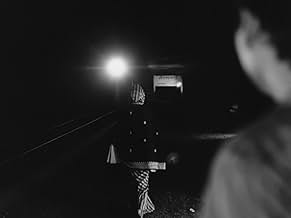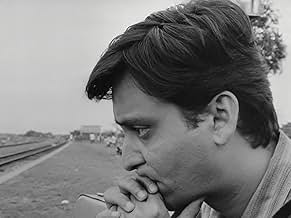IMDb RATING
7.6/10
2.6K
YOUR RATING
A chance meeting rekindles old memories between a screenwriter and his ex-girlfriend, who is by now married to a well-to-do man.A chance meeting rekindles old memories between a screenwriter and his ex-girlfriend, who is by now married to a well-to-do man.A chance meeting rekindles old memories between a screenwriter and his ex-girlfriend, who is by now married to a well-to-do man.
- Director
- Writers
- Stars
- Awards
- 1 win & 1 nomination total
Soumitra Chatterjee
- Amitabha Roy
- (as Soumitra Chattopadhyay)
Madhavi Mukherjee
- Karuna Gupta
- (as Madhabi Mukhopadhyay)
Haradhan Bannerjee
- Bimal Gupta
- (as Haradhan Bandyopadhyay)
- Director
- Writers
- All cast & crew
- Production, box office & more at IMDbPro
Featured reviews
Two years after Jean Luc Godard's brilliant "Contempt" ("Le Mepris," 1963), about a feckless screenwriter, who loses his wife to a wealthy and powerful man, Satyajit Ray released his film about a feckless screenwriter, who lost his college girl friend to a wealthy and powerful man. I wonder what these directors have against screenwriters. Could it be that they did not like the scripts they were getting and had to sweat over their own? A car driven by Soumitra Chatterjee breaks down in a remote village and the local garage will have to send away for a part. But it just so happens that a friendly man of substance is in that same garage at that same time and offers the writer the hospitality of his home. The writer agrees and when they reach their destination, it just so happens that the man of substance is married to the writer's college girl friend (Madhavi Mukherjee), who he rejected but never got over. Perhaps a professional screenwriter would be uncomfortable with all these coincidences, but, once accepted, there's much suspense in how this ends.
(1965) The Coward/ Kapurush
(In Bengali with English subtitles)
DRAMA
Adapted from the short story ""Janaiko Kapurusher Kahini" by Premendra Mitra music, co-written and directed by Satyajit Ray that tells about an inspiring screenwriter, Soumitra Chattopadhyay as Amitabha Roy (also known as the Coward) by chance meeting an ex-former flame, Karuna (Madhabi Mukhopadhyay), and he continues to pursue for her affections despite her already married with an already successful owner Bimal Gupta (Haradhan Bandyopadhyay). Throughout the entire movie, viewers get to witness flashbacks how the two first met and what drove them apart.
It is not just a movie about a young man vying affections for a former flame, for it is also about class, culture and principle. I love the civil discussions that does not involve murder. This is the sixth of fourteen films actor Soumitra Chatterjee collaborated with writer/ director Satyajit Ray.
Adapted from the short story ""Janaiko Kapurusher Kahini" by Premendra Mitra music, co-written and directed by Satyajit Ray that tells about an inspiring screenwriter, Soumitra Chattopadhyay as Amitabha Roy (also known as the Coward) by chance meeting an ex-former flame, Karuna (Madhabi Mukhopadhyay), and he continues to pursue for her affections despite her already married with an already successful owner Bimal Gupta (Haradhan Bandyopadhyay). Throughout the entire movie, viewers get to witness flashbacks how the two first met and what drove them apart.
It is not just a movie about a young man vying affections for a former flame, for it is also about class, culture and principle. I love the civil discussions that does not involve murder. This is the sixth of fourteen films actor Soumitra Chatterjee collaborated with writer/ director Satyajit Ray.
After watching two rather lengthy, rambling Ray films, "Big City" and "Charulata", it was nice to see this concise, 70 minute parable about the folly of turning one's back on love because one is scared to commit. Felt like a combination of DeMaupassant, with the twist of the knife at the end, and Maugham, with the tawdry, tea plantation setting. Add a dash of James M Cain (the lonely, alcoholic husband) and you've got a most satisfying movie. Give it an A.
The most fascinating quality about Kapurush is its brevity – the brevity of the film runtime (74 mins), its terseness in dialogues and the concision in expressions delivered by the protagonists of this film. It is a remarkable craft.
It's hard to imagine for any film maker of international repute to deal with a subject like Kapurush and tackle in-depth human emotions and consciousness, so succinctly and precisely, in just about 74 minutes. Some filmmakers would take alteast the normal 120-140 minutes length to be able to deal with a subject like Kapurush in order to give a wholesome cinematic form. Satyajit Ray took just 74 times to tell a story revolving around 3 main characters, depicting their psyche and intense mental turmoil – all unspoken but using subtle eye movements and small body gestures. The film is the finest example of optimal usage of speech, gesture, expression and length. The film highlights Ray's prowess in the economy of speech and cinematic resources. Kapurush inevitably epitomizes Ray's mastery and control over every aspects of film-making.
The ending of the film is undoubtedly the most exciting part - as with many of Ray's films, it leaves the audience to draw several conclusions, and as a result makes you think. And that's what makes Ray's films so unique – they are all subtle, calm and composed films – but after you have seen them, they bore a deep imprint on your mind and makes you think. Kapurush is one of them.
Unfortunately, Kapurush is a highly underrated film, perhaps because Ray is impeccable and had consistently produced masterpieces. As a result of this, a film like Kapurush got overshadowed. For any other world-class film-maker of today, it would have been a jewel in his or her oeuvre. Well, as I always say – Satyajit Ray is the God of Cinemas....period.
It's hard to imagine for any film maker of international repute to deal with a subject like Kapurush and tackle in-depth human emotions and consciousness, so succinctly and precisely, in just about 74 minutes. Some filmmakers would take alteast the normal 120-140 minutes length to be able to deal with a subject like Kapurush in order to give a wholesome cinematic form. Satyajit Ray took just 74 times to tell a story revolving around 3 main characters, depicting their psyche and intense mental turmoil – all unspoken but using subtle eye movements and small body gestures. The film is the finest example of optimal usage of speech, gesture, expression and length. The film highlights Ray's prowess in the economy of speech and cinematic resources. Kapurush inevitably epitomizes Ray's mastery and control over every aspects of film-making.
The ending of the film is undoubtedly the most exciting part - as with many of Ray's films, it leaves the audience to draw several conclusions, and as a result makes you think. And that's what makes Ray's films so unique – they are all subtle, calm and composed films – but after you have seen them, they bore a deep imprint on your mind and makes you think. Kapurush is one of them.
Unfortunately, Kapurush is a highly underrated film, perhaps because Ray is impeccable and had consistently produced masterpieces. As a result of this, a film like Kapurush got overshadowed. For any other world-class film-maker of today, it would have been a jewel in his or her oeuvre. Well, as I always say – Satyajit Ray is the God of Cinemas....period.
This is the story about regretting one's past life choices. Amitabha Roy is traveling from Calcutta to the country to visit his brother-in-law and to write, he's a tv screenwriter. Along the way he has car trouble and while at the mechanic's a friendly and rather round tea plantation owner named Bimal Gupta, insists on hosting him at his home while his car is being prepared.
"You want shelter and I want company."-Bimal
"You won't believe this but we get on average less than one Bengali in distress per year."-Bimal
They have a congenial drive in the rain to Bimal's plantation where Amitabha meets Bimal's wife who is none other than his ex-girlfriend Karuna. The two don't say anything to Bimal about knowing one another and have to endure an evening of Bimal pushing smokes and alcohol on Amitabha while Karuna knits quietly by the fire.
We see the end of their (Amitabha and Karuna's) relationship in a flashback. Then Amitabha asks Karuna if she is happy in her marriage. He tells her he must know, he never got married and he never could ask her forgiveness...he told her that everything seemed so pointless and Calcutta so boring.
"There's just one thing I couldn't do, fall in love again."-Amitabha "I didn't have the courage then, but now I do. Leave him...and come with me."
"You think you know my husband after one day? You don't know him."-Karuna
The next day is probably my favorite section of the film as Bimal and Karuna take Amitabha for a tour and picnic via their Jeep. It's the most visually appealing part of the film...and emotionally it adds to the ache as you can feel Amitabha's pain and regret and you can just about hear his what if.
While not my first Indian film by any means, it was only my second Satyajit Ray film as I had seen his film Devi (The Godess) previously. Like Devi, there is wonderful cinematography in this film and I enjoyed the slow moments...especially those that focused on facial expressions. Beautiful film that expresses ache and regret in such a straightforward way. I feel like it is an excellent cautionary tale.
"You want shelter and I want company."-Bimal
"You won't believe this but we get on average less than one Bengali in distress per year."-Bimal
They have a congenial drive in the rain to Bimal's plantation where Amitabha meets Bimal's wife who is none other than his ex-girlfriend Karuna. The two don't say anything to Bimal about knowing one another and have to endure an evening of Bimal pushing smokes and alcohol on Amitabha while Karuna knits quietly by the fire.
We see the end of their (Amitabha and Karuna's) relationship in a flashback. Then Amitabha asks Karuna if she is happy in her marriage. He tells her he must know, he never got married and he never could ask her forgiveness...he told her that everything seemed so pointless and Calcutta so boring.
"There's just one thing I couldn't do, fall in love again."-Amitabha "I didn't have the courage then, but now I do. Leave him...and come with me."
"You think you know my husband after one day? You don't know him."-Karuna
The next day is probably my favorite section of the film as Bimal and Karuna take Amitabha for a tour and picnic via their Jeep. It's the most visually appealing part of the film...and emotionally it adds to the ache as you can feel Amitabha's pain and regret and you can just about hear his what if.
While not my first Indian film by any means, it was only my second Satyajit Ray film as I had seen his film Devi (The Godess) previously. Like Devi, there is wonderful cinematography in this film and I enjoyed the slow moments...especially those that focused on facial expressions. Beautiful film that expresses ache and regret in such a straightforward way. I feel like it is an excellent cautionary tale.
Did you know
- TriviaThis film is featured as a bonus on "The Big City", released by the Criterion Collection, spine #668.
- GoofsThe shadow of the boom mic is clearly visible on the wall at the start of the first flash-back scene.
- Quotes
Amitabha Roy: All this palm reading was just an excuse to hold your hand.
Karuna Gupta: You think it wasn't an excuse for me to offer it?
- Alternate versionsThere is an Italian edition of this film on DVD (Extra Movie in "APARAJITO"), re-edited with the contribution of film historian Riccardo Cusin. This version is also available for streaming on some platforms.
- How long is The Coward?Powered by Alexa
Details
- Release date
- Country of origin
- Official site
- Languages
- Also known as
- The Coward
- Production company
- See more company credits at IMDbPro
- Runtime1 hour 10 minutes
- Color
- Sound mix
- Aspect ratio
- 1.37 : 1
Contribute to this page
Suggest an edit or add missing content

